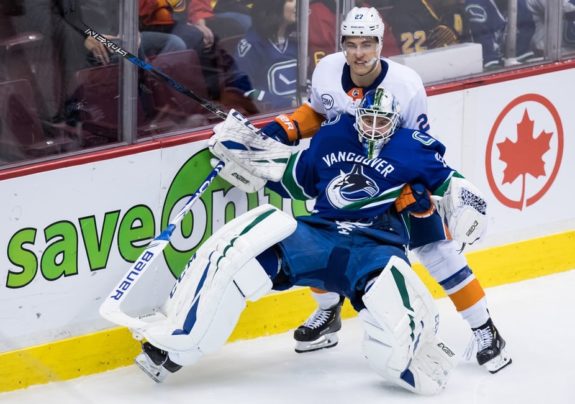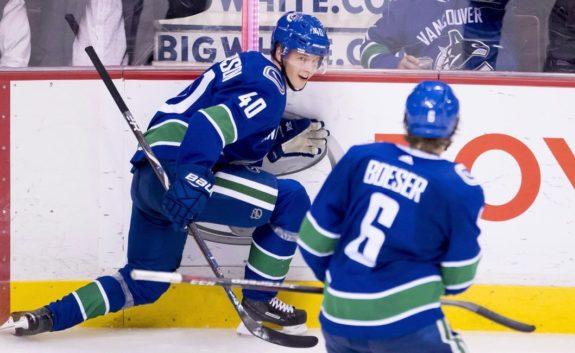Currently, the Vancouver Canucks are skating towards a post-season without playoffs. However, after the team’s loss to the Vegas Golden Knights on Saturday night, the Hockey Night in Canada panel lauded the team’s future potential – just not this season.
Really, no one predicted a strong season for the Canucks. It was to be a rebuilding season, but two primary surprises lifted the Canucks in the standings, and in their fans, hope for a stronger future.
The first surprise was Elias Pettersson. He burst onto the scene and was much better than anyone expected. The second was the maturation of goalie Jacob Markstrom, who showed how good a goalie he could be. He struggled against Vegas in this last game, but has regularly been the Canucks’ best player in other games.

Fortunately for the team, it looks like these players won’t carry the team alone. The Canucks have started to collect a number of building blocks for creating a solid team next season.
Building Block #1: Travis Green
The core of the Canucks’ improvement is coach Travis Green. He makes hard decisions, knows how to handle young players (of which there are several), stands up for his players and his teams work hard and play tough hockey. Green’s coaching has made a difference. His abilities and experience will pay dividends next season when the Canucks will ice more talent.
Related – Canucks News: Playoffs, Leighton, Pettersson & Power Rankings
Building Block #2: Bo Horvat
Bo Horvat, only 23 years old, is a five-year veteran. He was drafted at the 2013 NHL Draft when the Canucks traded goaltender Cory Schneider to the New Jersey Devils for the ninth-overall pick. Horvat played his NHL game on Nov. 4, 2014, and scored his first NHL goal on Nov. 20, 2014. He’s been a regular for almost five seasons.
Horvat has exceeded expectations. Although this season he’s struggled with consistency, he’s also played with a parade of different wingers. With the same partners during the 2017-18 season (the “Triple B” line of Sven Baertschi, Horvat and then-rookie Brock Boeser), he thrived.

This season, Horvat scored his 24th goal in a 6-2 loss to the Golden Knights on Saturday and has 49 points with more than 200 shots on goal. He’s already a top-line center, but plays in all situations. He also plays defense, with 63 blocked shots this season.
With 13 games remaining, he’s only three points behind his 2016-17 career high of 52 points. He’s been productive for several seasons, having scored 20 goals in three straight. He’s a leader who will lead a stronger team next season.
Building Block #3: Jacob Markstrom
As Green noted earlier in the season, Markstrom is one of the team’s leaders. Earlier, Markstrom struggled because he often got caught in his emotions, but notes that he’s playing relaxed these days, and keeping his cool on the ice.
He has grown steadier all season and now has a 24-20-8 record, a 2.78 goals-against average and a .912 save percentage in 52 games played. He’s already topped his career-high 23 victories of last season.
After Pettersson, Markstrom is the Canucks’ second-biggest surprise. With him manning the crease, the Canucks can play an aggressive style, confident that a mistake won’t always result in a goal against.
Building Block #4: Elias Pettersson
I probably should have listed Pettersson as the most important Canucks building block. He certainly is on almost every hockey reviewer’s list of why the Canucks are an improved team this season. He’ll soon be awarded the Calder Trophy, and he’s nothing short of amazing.
Related: Pettersson Is the Canucks’ Best Rookie Ever
I have written about Pettersson before because he has been the team’s shining light. He needs to gain strength, because the physical play of the NHL can be draining. Perhaps it’s wearing on him now, because he has only four assists in his last seven appearances and only six shots on goal during those games. He’s still on-pace for a point-a-game, with 58 points in 58 games. When he grows stronger, watch out.
Building Block #5: Brock Boesser
Canucks fans should remember that Boesser is only a second-year player. His rookie season was cut short by a back injury, which probably cost him the Calder Trophy. However, he’s come back strong. In Saturday’s 6-2 loss to the Golden Knights, he scored his 22nd goal of the season and had seven shots on goal. He’s been a producer for two seasons.
This season, he has 47 points in 56 games and 172 shots on goal. With 13 games remaining, he’s likely to top last season’s 55 points if he stays healthy.

Boeser is an offensive winger and a natural goal scorer. He’s an accurate shooter and a great passer, but perhaps his greatest skill is how he holds on to the puck. Under Green’s tutelage, look for Boeser to improve his defensive game and win more puck battles on the boards. He’s already a strong scorer who both creates and finishes plays. He’ll certainly be a Canuck building block for the future.
There’s More Coming Next Season
In naming these building blocks, I’ve only focused on players who’ve been with the team this season. I also haven’t mentioned some of the depth forwards whose presence has improved the Canucks forward lines, such as Baertschi, who’s been injured much of the season, and new addition Josh Leivo.
Related – Canucks News: Goalie Trade, Pettersson’s Great Day & Demko’s Coming
There’s also Quinn Hughes, who signed a three-year entry-level contract on Sunday. He is an offensive-minded defenseman drafted seventh overall last June. He was one of the best prospects in all of college hockey this season and is expected to add to the team’s success next season.
Last season showed improvement; this season was surprisingly better; and next season looks to be a playoff year for the team. That’s good news for Canucks fans.